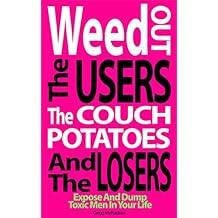
If you’re somewhere between 15 and 70, you are likely to be
dating or know someone who is. This book is for those women who hope to find
Mr. Right among a multitude of Mr. Wrongs. And those of us who like to advise them..
Drawing on his experience of two decades of counseling and
advising, during which he has written some 20 books, relationship guru Gregg
Michaelsen describes three families of the Wrong clan (Users, Losers, Snoozers),
and contrasts them with Mr. Right, a man you can link up with, if you are at
your best.
Users are con men, glib, with an eye for your weaknesses,
initially all you could ask for, but quickly asking for more than they give,
more than you want to supply. Generosity goes down to stinginess. Attention
fades to inattention.
He’ll continue to date others. You'll do him favors, but get
little in return. His conversation centers around him and his interests, not yours.
In the extreme, he is a narcissist. The world, including you, is to revolve
around him.
“Time heals all wounds,” the saying goes. Turned around as,
“time wounds all heels,” this applies here. Go slow with the User, and he’ll show his
true colors.
The Loser is a parasite, not a partner. He won’t commit. He
may think he wants a committed relationship; you may hope so, but it is not likely
to happen.
An acquaintance of mine “invested” about five years with a
loser, mostly a waste of time. Dropping him opened up space for her to get a better
man.
Michaelsen suggests a four-date test sequence: meet his
friends; have him meet with your friends; let him drink too much, while you
stay sober; meet his family. Observe, judge, act. You are weeding, making room in
your garden.
If he does marry you, you’d be better off single. When you
need him, he’ll be elsewhere. If you blame him, you’ll only waste your time; he
plays the Victim expertly.
Michaelsen writes that two other types hold promise, the
Snoozer, and Mr. Right.
Snoozer can be transformed, trained, to become a Mr. Right.
Michaelsen writes, however, that Snoozers are inconsistent. To transform one, you must wield carrot and stick, praise for good behavior, withdrawal for
bad, like training a puppy. Effective, though not romantic.
Here is Michaelsen’s Mr. Right: “He takes 100% responsibility…. the
opposite of the victim mentality.” He has goals and plans, enthusiasm, respect
for others, reliability…and, furthermore, he is always wooing you, openly or
subtly.
He is always chasing you, because you have made yourself
into a “high-value woman,” one any self-confident man would want.
I found this book informative and entertaining. You don’t
have to be a woman to get a lot out of it. For a man, it could help you become a Mr. Right.
###
Here's the link to the book on amazon.com: Weed Out the Users
###
I write, coach, and edit through my business at
![Self-Made Authority: How to Position Yourself As The "Go To Person" In Your Field and Catapult your Business Beyond the Competition by [Momeni, Oliver]](https://images-na.ssl-images-amazon.com/images/I/51ijJLF46DL.jpg)

